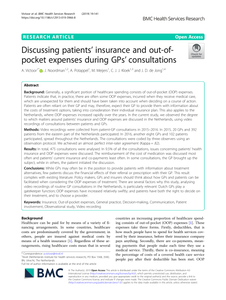Background: Generally, a significant portion of healthcare spending consists of out-of-pocket (OOP) expenses. Patients indicate that, in practice, there are often some OOP expenses, incurred when they receive medical care, which are unexpected for them and should have been taken into account when deciding on a course of action. Patients are often reliant on their GP and may, therefore, expect their GP to provide them with information about the costs of treatment options, taking into consideration their individual insurance plan. This also applies to the Netherlands, where OOP expenses increased rapidly over the years. In the current study, we observed the degree to which matters around patients' insurance and OOP expenses are discussed in the Netherlands, using video recordings of consultations between patients and GPs. Methods: Video recordings were collected from patient-GP consultations in 2015-2016. In 2015, 20 GPs and 392 patients from the eastern part of the Netherlands participated. In 2016, another eight GPs and 102 patients participated, spread throughout the Netherlands. The consultations were coded by three observers using an observation protocol. We achieved an almost perfect inter-rater agreement (Kappa = .82). Results: In total, 475 consultations were analysed. In 9.5% of all the consultations, issues concerning patients' health insurance and OOP expenses were discussed. The reimbursement of the cost of medication was discussed most often and patients' current insurance and co-payments least often. In some consultations, the GP brought up the subject, while in others, the patient initiated the discussion. Conclusions: While GPs may often be in the position to provide patients with information about treatment alternatives, few patients discuss the financial effects of their referral or prescription with their GP. This result complies with existing literature. Policy makers, GPs and insurers should think about how GPs and patients can be facilitated when considering the OOP expenses of treatment. There are several factors why this study, analysing video recordings of routine GP consultations in the Netherlands, is particularly relevant: Dutch GPs play a gatekeeper function; OOP expenses have increased relatively swiftly; and patients have both the right to decide on their treatment, and to choose a provider.
DOCUMENT

This study evaluated the Toddler Oral Health Intervention (TOHI) for preventing early childhood caries (ECC) by 48 months. TOHI, an add-on to standard care in well-baby clinics (WBCs), aims to reduce ECC incidence and severity.
MULTIFILE

Abstract Background. Fever in children is common and mostly caused by self-limiting infections. However, parents of febrile children often consult in general practice, in particular during out-of-hours care. To improve management, it is important to understand experiences of GPs managing these consultations. Objective. To describe GPs’ experiences regarding management of childhood fever during out-ofhours care. Methods. A descriptive qualitative study using purposeful sampling, five focus group discussions were held among 37 GPs. Analysis was based on constant comparative technique using open and axial coding. Results. Main categories were: (i) Workload and general experience; (ii) GPs’ perceptions of determinants of consulting behaviour; (iii) Parents’ expectations from the GP’s point of view; (iv) Antibiotic prescribing decisions; (v) Uncertainty of GPs versus uncertainty of parents and (vi) Information exchange during the consultation. GPs felt management of childhood fever imposes a considerable workload. They perceived a mismatch between parental concerns and their own impression of illness severity, which combined with time–pressure can lead to frustration. Diagnostic uncertainty is driven by low incidences of serious infections and dealing with parental demand for antibiotics is still challenging. Conclusion. Children with a fever account for a high workload during out-of-hours GP care which provides a diagnostic challenge due to the low incidence of serious illnesses and lacking longterm relationship. This can lead to frustration and drives antibiotics prescription rates. Improving information exchange during consultations and in the general public to young parents, could help provide a safety net thereby enhancing self-management, reducing consultations and workload, and subsequent antibiotic prescriptions.
DOCUMENT
